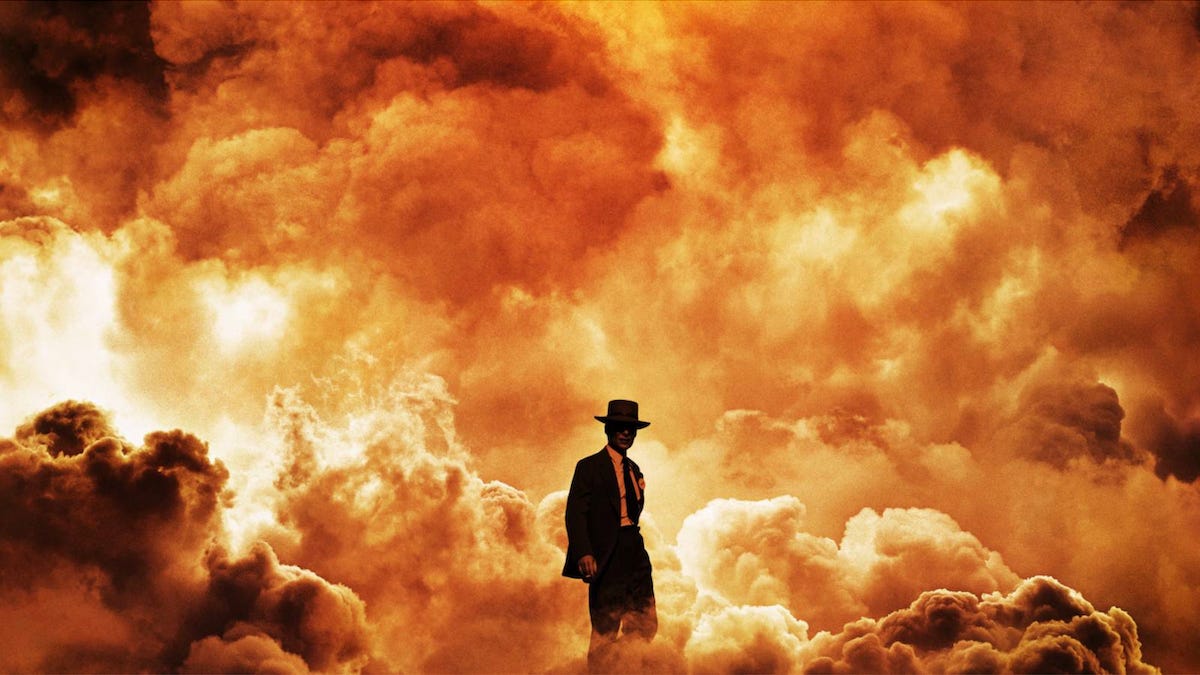The Poetry of Oppenheimer
A Christian reflection on Christopher Nolan's latest intelligent blockbuster
Regular readers: please forgive a two week absence in my posting. We welcomed our third child into the world on Thursday 6th of July, so life has been somewhat up in the air since then. Thank you for your patience—normal service shall now be resumed.
As I made my way to a preview screening of Oppenheimer on Tuesday (held in the atmospheric venue of London Science Museum), I was mindful of something I’d written after the release of Tenet back in 2020:
We’re rightly grateful for the “Event Cinema” Nolan provides, but what is the event about? Nolan has long insisted film is a medium for the movie theatre, but is there anything to chew on once the lights come up? Does the most popular director in the world actually have anything to say about time? Or is it all full of sound and fury, signifying nothing?
My conclusion: charges of “all style, no substance” against Nolan aren’t fair. For twenty years, he’s been preoccupied with characters fighting against creaturely constraints, with races against time his chief metaphor for this. But his problem is that he lacks the metaphysics for showing how human beings can transcend their creatureliness. Pre-Inception, his characters largely failed to overcome their limits; in Inception, Cobb accepts his limits; since Interstellar, Nolan’s protagonists have been overcoming their limits, but inexplicably so.
With this framework in mind, Oppenheimer—the story of the Father of the Atomic Bomb—was always going to be a tantalising prospect.
A brief word on my overall impression of Oppenheimer: I was slightly disappointed. It’s a 3 star movie with 5 star elements, competing with Tenet for Nolan’s weakest—mainly because it is not tight enough. This is unforgivable for the man who directed The Dark Knight, a film whose theme word during production was “escalation”. At 3 hours, Oppenehimer could have cut 30 minutes from the long interrogation scenes which dominate its final third. This section felt like a sub-Aaron Sorkin procedural drama; it ticked, but it didn’t zing.
But, of course, Nolan firing on three stars is as good as most anybody else firing on five. At its best, Oppenheimer is superb, and Nolan actually tries new things—not least of, for once, a real character drama. What’s more, I am a sucker for films which, whatever their cinematic flaws, engage Big Ideas, which Oppenheimer certainly does.
Front and centre among these “big ideas” is the perhaps ethics of the A-bomb, and how this tortured Oppenheimer. Through the shifts between subjective colour scenes and objective black-and-white, we are left wondering to what extent Nolan’s Oppenheimer is just like Leonard in Memento, trying to cast himself as the hero in his own story. I wish Nolan hadn’t told us beforehand that this was what he was up to, but it’s excellently done nonetheless.
The film’s ethical wranglings did not interest me so much, however. Rather, I wanted to see if Nolan was still mulling the question of creaturely limits—and on this score, I was not disappointed.




